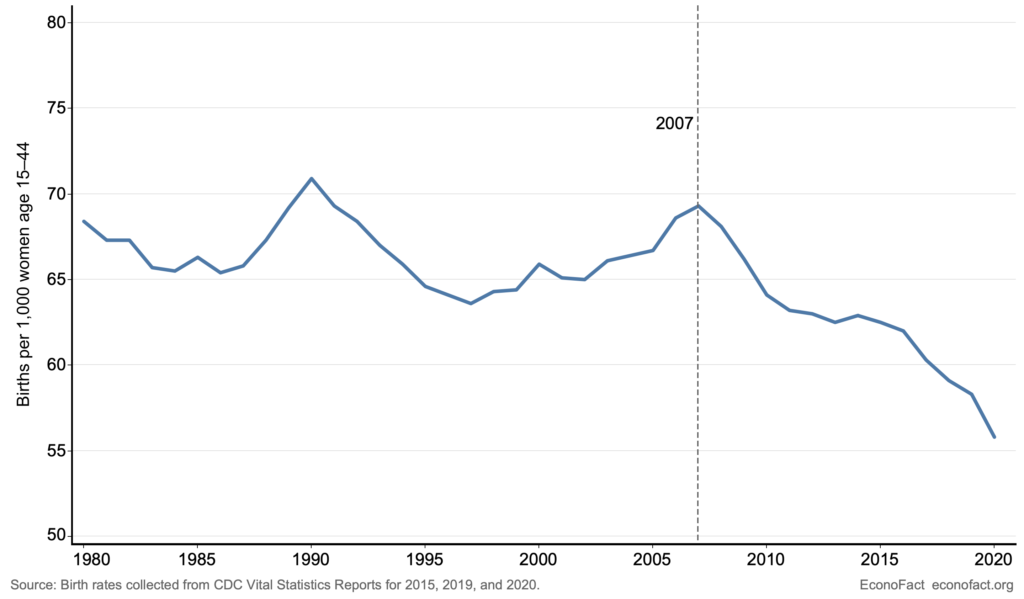
The most consequential change in the role of women is getting scant attention during Women’s History Month.
A rising percent of women in the developed world do not intend to have children. In a 2021 survey by PEW Research, 44% of childless U.S. adults of childbearing age said they were “not too likely or not at all likely” to have children, up from 37% in 2018. These are alarming numbers. They cry out for follow-up research.
Are they a temporary hangover of the pandemic, during which births actually increased among the college-educated according to other research, or an acceleration of ongoing trends, some good but most not so much?
Birth rates in many developed countries continue to be well below replacement level, making population decline inevitable. Starkly stated, development appears to be suicidal at the societal level. Recall the Shakers who believed in celibacy; they are no longer around.
Some may say “no problem here,” since fertility is only one of three factors affecting population growth. Life expectancy has been improving dramatically in the developed world; and there’s a global migration wave from the developing to the developed world. Both factors offset fertility decline, and the U.S. has been experiencing both.
But wait. Improved life expectancy is based upon ever more expensive health care and requires more and more spending on retirement. Think Medicare and Social Security, both of which are headed for insolvency. Ignoring cost, improved life expectancy is subject to the law of diminishing returns.
Uncontrolled immigration is extremely costly. Just ask New York City Mayor Eric Adams, as he contends with mere busloads that are a tiny percentage of overall U.S. immigration. Moreover, our dysfunctional and controversial non-system of immigration could finally trigger a backlash and the imposition of real restrictions.
Maybe there’s a problem here after all.
So, why don’t childless U.S. adults want to have kids? PEW found that, of childless adults younger than 40 who said it’s unlikely they will have children, 60% said they just don’t want kids. No reason, they just didn’t want them. It’s difficult to address a problem if those who manifest it don’t think it a problem.
How about the remaining 40%? PEW reports, “Among childless adults who say they have some other reason for thinking they won’t have kids in the future, no single reason stands out.” Diffuse problems are difficult to solve.
PEW also asked young parents whether they would have more kids. People with experience might well have informed answers, right? Well, no. An even higher number (60%) of parents under forty said they didn’t expect to, and 71% of those just didn’t want them.
A near-majority of non-parents and an overwhelming majority of parents did not expect to have kids or more kids, respectively, and an overwhelming majority of each group just plain didn’t want them.
It is revealing that most respondents did not offer the conventional explanations: men do not share childcare responsibilities equally; childcare options are unavailable or too costly; student debt makes kids unaffordable; housing is unaffordable; balancing career and childrearing is too difficult. They simply said they don’t want kids.
Why? Perhaps young adults do not want to admit their real reasons. Raising a family is hard work and requires real sacrifices. Maybe young singles and couples don’t want to give up their freedom and its enjoyments (those already parents do not want to lose more of theirs). Maybe they feel selfish. It is a well-known phenomenon in polling that respondents do not want to portray themselves poorly even in confidential polls.
Or maybe they lack confidence in the future, worrying that Social Security and Medicare will fail before they retire and that climate change will have drastic impacts.
Unwillingness to surrender personal freedom and/or lack of confidence in the future seem the likely explanations.
The implications of widespread disinterest in having children are grave and consequential. How will fewer future Americans service our fast-growing national debt. How will fewer American workers support already near-insolvent Social Security and Medicare?
Will improved life expectancy help or hurt? Only if health care operates to increase the working years, can longer lives help.
What if the current high level of costly uncontrolled immigration cannot persist in face of the great controversy it generates?
A stable non-growing population would be challenging enough, but a shrinking population is something entirely different.
Child-averse young adults today would seem to represent something akin to the Paradox of Thrift, where one individual’s thriftiness is another’s lost income, leading to a self-reinforcing economy-wide contraction. The more freedom that childless adults seek or the greater their doubts about the future, the worse the future prospects for them and their fellow countrymen, in what is surely a vicious cycle.
Declining fertility cannot be ignored given its dire implications. Washington should develop incentives encouraging procreation. Improving the nation’s fiscal outlook, something obviously urgent in its own right, would also elevate confidence in the future and encourage childbearing. Incentives and fiscal reform could combine to create a virtuous cycle.
![]()
Red Jahncke is a nationally recognized columnist, who writes about politics and policy. His columns appear in numerous national publications, such as The Wall Street Journal, Bloomberg, USA Today, The Hill, Issues & Insights and National Review as well as many Connecticut newspapers.




